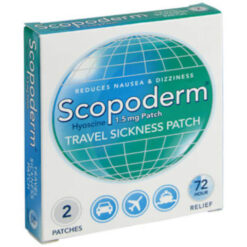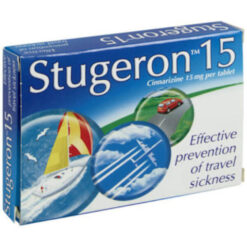What is Travel Sickness?
Travel sickness, or motion sickness, is a condition that occurs from a mismatch in the signals the brain receives from the inner ear, eyes, and body. When you’re moving, your inner ear (which controls balance) and your eyes send different information to your brain about the movement. For example, if you’re reading in a moving car, your eyes are focused on something stationary while your inner ear senses motion. This confusion can cause discomfort. It’s common in various forms of travel, such as driving in a car, flying in a plane, or sailing on a boat. While it doesn’t pose a severe health threat, it can make journeys less enjoyable.
What are the Symptoms of Travel Sickness?
The symptoms of travel sickness include:
- Nausea
- Vomiting
- Dizziness
- Sweating
- Feeling unwell
- Headache
- Increased saliva
These symptoms can start suddenly and become more intense with continuous motion.
What helps Travel Sickness?
To manage motion sickness, consider these tips:
- Look at the Horizon: Focus on distant objects rather than reading or looking at something inside the vehicle.
- Get Fresh Air: Open a window or go outside for fresh air.
- Sit in the Front Seat: In a car, sitting in the front seat reduces motion sensation. On a boat, stay in the middle where there’s less movement.
- Limit Food and Drinks: Before and during travel, avoid heavy, spicy, or fatty foods. Eat light and stay hydrated.
- Rest and Close Your Eyes: This can help reduce the sensation of motion.
- Ginger and Peppermint: Some find ginger and peppermint (in forms like candy, tea, or tablets) helpful when you feel nauseous
- Medication: Over-the-counter or prescription travel sickness medications can prevent or treat symptoms. Always check with a GP or pharmacist for recommendations suitable for you.
- Acupressure Bands: Wearing these can help some people by applying pressure to specific points on the wrist.
Each person may find different methods effective, so it might take some experimentation to find what works best for you.
Medication for Travel Sickness
Over-the-counter Treatment for Travel Sickness
Over-the-counter (OTC) options are widely available for managing travel sickness. They include:
- Antihistamines: These are the most common OTC medications for travel sickness. They can prevent symptoms if taken before travel. Tablets like Cinnarizine (Stugeron Tablets) work by blocking the histamine receptors in the brain, which are involved in the control of nausea and vomiting. They may cause drowsiness, so it’s important to refrain from driving or operating heavy machinery after taking them.
- Ginger Supplements: Available in capsules, these are a natural option that some people find effective for easing nausea.
Always read the label for dosing instructions and possible side effects. If you need help determining which option is best for you, ask a GP or pharmacist.
Prescription Treatment for Travel Sickness
For those who don’t find relief with OTC treatments, prescription medicines are available to treat motion sickness:
- Scopolamine Patch: Travel sickness patches are placed behind your ear a few hours before travel. It releases medication slowly to prevent nausea and vomiting for up to three days.
- Stronger Antihistamines: Some prescription antihistamines might be recommended if OTC options aren’t effective.
- Anti-nausea Medications: In some cases, medications specifically designed to prevent vomiting (antiemetics) might be prescribed.
It’s essential to consult with a GP or pharmacist to determine the most suitable medication for your needs, especially if you’re pregnant, breastfeeding, have underlying health conditions, or are taking other medications.













